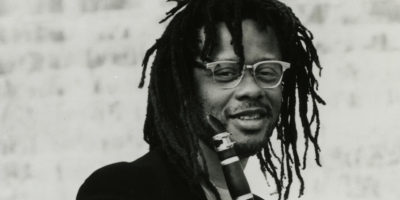
Publishing, Self-Publishing, and the Internet
A panel held during the Women’s Philharmonic‘s “Composing A Career” Symposium The New School for Social Research, NYC Saturday, November 6, 1999—2:30-3:30 p.m. Fran Richard : Vice President of Concert Music, ASCAP Ralph Jackson : Assistant Vice President, Classical Music Administration, BMI Linda Golding : President, Boosey & Hawkes Jennifer Higdon : Self-Published Composer Frank… Read more »

The State of Music Publishing
Arnold Broido (Chairman and Past-President of Theodore Presser Company and Chairman of the International Confederation of Music Publishers) and his son, Tom Broido (Presser’s current President) describe the current state of music publishing and how that impacts the publication of new music.

Don Byron: Sitting on the Fence
Composer and Clarinetist Don Byron continues to defy expectations with every album and concert appearance he is associated with–whether his departure point is jazz, klezmer, hip-hop, contemporary classical music, or some strange hybrid that is somehow both all and none of the above.

Paul Bowles meets with Ken Smith and Frank J. Oteri
Frank J. Oteri and Ken Smith with Paul Bowles Photo by Melissa Richard January 1, 1998 Tangier, Morocco KEN SMITH: I’d like to talk a bit about your life in New York, the days when you were writing for the New York Herald-Tribune. PAUL BOWLES: It was years… KEN SMITH: The years, then, that you… Read more »

An Arts Education Symposium
The legendary American educational philosopher Maxine Greene (b. 1917) met with Hollis Headrick (Executive Director, The Center for Arts Education), Polly Kahn (Director of Education, New York Philharmonic), Richard Kessler, and Frank J. Oteri to discuss the role new music could p[lay in arts education.

A "Virtual Séance" with the Founders of the American Music Center
In celebration of the 60th anniversary of the founding of the American Music Center, the history of the AMC is here presented exclusively in the words of its six founders–Aaron Copland, Howard Hanson, Otto Luening, Quincy Porter, Marion Bauer, and Harrison Kerr–culled from archival interviews, books and letters and then shuffled and re-organized to emulate a conversation.

The Philadelphia Orchestra at 100
To celebrate The Philadelphia Orchestra’s centenary on November 16, 2000, the artistic and management team of the orchestra decided to devote their entire 2000-2001 concert season exclusively to music composed since the orchestra was founded–that is to say the music of the 20th century.

Tania León: What it Means to be an American Composer
Although raised in Cuba, Tania León was born into a family that had roots from all different parts of the globe. Since arriving in the United States, where she has been based since 1967, she has come to realize that her own multicultural heritage is what makes her a quintessentially American composer.

The Ravinia Festival: A talk with Zarin Mehta
During his tenure as the President and CEO of The Ravinia Festival, Zarin Mehta (would would later become Executive Director of the New York Philharmonic), explained the delicate balancing act of presenting live music, a balancing act which is sometimes at odds with the presentation of new music.

Foster Reed of New Albion Records
One of the original “indie-classical” labels, San Francisco-based New Albion Records defined the West Coast Sound and helped to launch the careers of John Adams, John Luther Adams, Ingram Marshall, Paul Dresher, Stephen Scott, Chen Yi, Sarah Cahill, David Tanenbaum, Margaret Lang Tan, and many others. New Albion’s founder Foster Reed explains the label’s philosophy.

The Who and Why of Bang on a Can
For the premiere issue of NewMusicBox (May 1999), the three founders of Bang on a Can–Michael Gordon, Julia Wolfe, and David Lang–met at ASCAP for a lengthy conversation with Frank J. Oteri, Richard Kessler, and Fran Richard about the current state of new music.

From California to Alaska: Lou Harrison in Conversation with John Luther Adams
Two major American maverick composers talk via telephone about creating music without compromise, the impending end of the 20th century, and how to develop new audiences for new music in the future.

Libby Larsen: Communicating Through Music
Composer and American Composers Forum co-founder Libby Larsen talks about how she came to music, taking charge of her own path as a composer, and how to be a good musical citizen.

Dave Liebman: Unabashed Eclectic
Saxophonist, composer, band leader, and one-time Miles Davis sideman Dave Liebman talks about the changing directions in jazz during his four decades involved in the scene.

Paul Kellogg: Life Beyond Bohème, Carmen, and Traviata
Paul Kellogg, then artistic director of both Glimmerglass and New York City Opera describes how these opera companies “show people that there is life beyond Bohème, Carmen, and Traviata.”

Thomas Hampson: Singing American Songs
Baritone Thomas Hampson describes his unending fascination with American art songs.

Steve Reich in Conversation with Richard Kessler
In this 1998 interview, which was the blueprint for “In The First Person” (and subsequently “Cover”) on NewMusicBox, Steve Reich reflects on the changes in the music scene that had occurred over the past thirty years. “Thirty years ago I had just returned to New York City from San Francisco. […] At that time, everybody was under the influence of music that was not ‘pulsitile,’ [not with a regular beat]. You can’t tap your foot to either Boulez or John Cage.”

